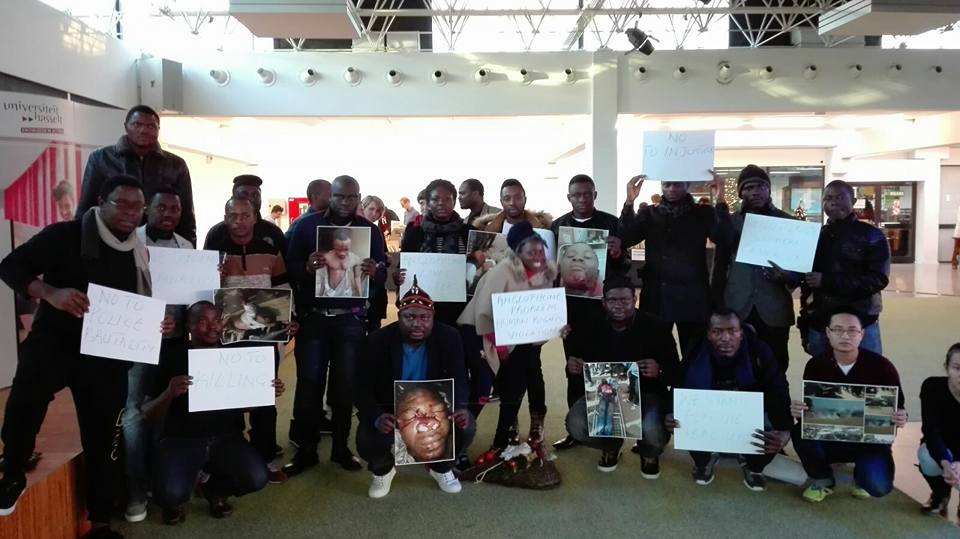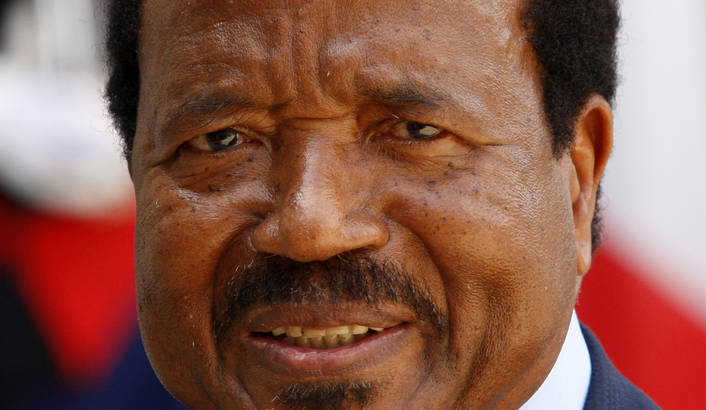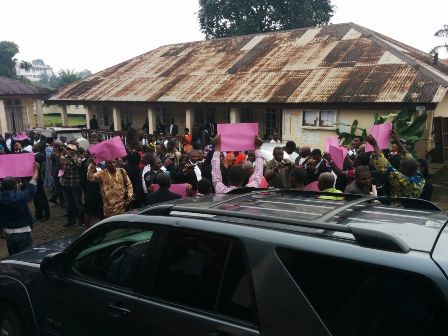Good people of the Cameroons
I am Bara Mark, citizen of former British Southern Cameroons, now part of La Republique du Cameroun. I am grateful to be part of this event. A come together to pay homage to the lives lost in Anglophone Cameroon. Permit ask for a minute of silence. Now, some historical facts
Brief Historical Facts:
The Southern Cameroons was under British rule from 1858 to 1887, and then from 1915 to 1961, a total period of nearly 80 years. That long British connection left an indelible mark on the territory, bequeathing to it an Anglo-Saxon heritage. The territory’s official language is English. Its educational, legal, administrative, political, governance and institutional culture and value systems are all English-derived.
The Southern Cameroons was under international tutelage with the status of a class ‘B’ territory, first as a British-Mandated Territory of the League of Nations from 1922-1945, and then as a British-administered United Nations Trust Territory from 1946 to 1961.
Up to 1960, the Southern Cameroons though under international tutelage was administered by Britain as part of her contiguous colonial territory of Nigeria. But its distinct identity and personality, separate from Nigeria, remained unassailable. UN Resolution 224 (III) of 18 November 1948 protected the Trust Territory from annexation by any colonial-minded neighbour. While acknowledging that the Trusteeship Agreement makes allowance for ‘administrative union’, the Resolution provides that “Such a union must remain strictly administrative in its nature and scope, and its operation must not have the effect of creating any conditions which will obstruct the separate development of the Trust Territory, in the fields of political, economic, social and educational advancement, as a distinct entity.”
In 1961, 11th February, Southern Cameroons had a plebiscite where they voted overwhelmingly to join East Cameroon or La Republique Du Cameroun. From 1961 to 1972, Southern Cameroons was in a Federal union with La Republique and by 20th May 1972, a referendum was conducted to abolish the Federal structure against article 47 of the constitution- this was the beginning of the Anglophone Cameroon
The Anglophone Problem:
Worthy to note is that the Anglophones are a people, the Anglophones are not a tribe. In international law , a people are those who have rights to self-determination and the Anglophones here refers to citizens from former British Southern Cameroons who constitute the present North West and South West Regions. The Anglophones are a people who voted voluntarily on 11th February 1961 to join French Cameroon- La Republique Du Cameroun based on two states of equal status. It should be noted that the 11th February vote was a matter of political expression. It was an intention made by the people of Southern Cameroons to join Cameroun. There were several things which needed to be done to legalized the 11th February vote and make the Union binding- that never happened.
Secondly, it is important to note that each country has problems. Minority groups and people of colour all over got peculiar problems in the nation they belong. In Cameroon the pygmies, Bamilekes, Doualas, Nordist, Bakweries etc all have problems. These tribes have problems peculiar to their regions. There is a Cameroonian problem. Cameroon has a problem of corruption, unemployment, tribalism, nepotism, governance etc and each region of the Country cries of their own problems.
The Anglophone problem is neither of the above nor the Anglophone problem is about marginalization, appointments, developments, infrastructure etc. These are sub-issues of the Anglophone problem. Thus, the Anglophone problem cannot be compared to any other problems in the Cameroons. This is so because the Anglophone problem is unique and distinct.
The Anglophone problem is a Constitutional problem. It is a constitutional problem because a certain people with a distinct way of life and culture called Southern Cameroonians voted to join another group of people called Eastern ( French Cameroon) based on certain terms which have not been respected. The problem is an identity problem. Recalled that in 1972, President Ahmadou Ahidjo against the spirit and letter of the constitution pushed through a new document that abolished the federal system, renamed the country the United Republic of Cameroon, and granted the president greater powers. After assuming the presidency, Paul Biya again in their assimilation style pushed through a revised Constitution in 1984. This document changed the country’s name to the Republic of Cameroon- the name French Cameroon had at independence on 1st January 1960 thus completing the colonization and assimilation of Southern Cameroons.
This is the Anglophone Problem-The Constitutional problem. The problems the lawyers and teachers are crying today would not have been up if we would have remained in a Federal structure.and here we are today.




Southern Cameroonians in Hasselt Belgium.
Current Situation:
Slightly over two months ago, lawyers of English (Anglophone) extraction from these regions commenced a sit-down strike action aimed at calling the government in place to undertake sweeping reforms to reinstate legal values inherent to their anglo-saxon character by virtue of their training & practice. After paying a deaf ear to the grievances tabled by the lawyers, these learned men of law in their straight-edged legal robes and wigs decided to maintain or prolong their strike action until their demands are properly addressed by the powers that be. Sad enough to note that these men of law decided to undertake two peaceful protest marches on the regional capitals of Bamenda and Buea respectively whence they were met with brutal excesses perpetrated against them by the supposed forces of law and order of the Cameroons.
Many of them suffered severe injuries, robes and wigs seized, offices of lawyers vandalized and ransacked most of them beaten and chased out of their hotel rooms and above all, these sane custodians of the law were arrested and detained and released days after by repressive elements of the high-handed ruthless police, gendarmes and military of La Republique du Cameroun. If this could happen to lawyers, supposed custodians of the law, then it could happen just to any other Cameroonian regardless of one’s status in society. These acts and subsequent ones have and till today receive international condemnation
In a similar way, teachers of anglo-saxon extraction also feeling frustrated and sidelined announced the commencement of a downing of tools and staying off the classrooms strike to commence November 21st 2016. The teachers of Anglophone extraction also called for a total boycott of classes by both teachers and students in the two Anglophone regions and seriously advocated for non-violent action. At the beginning of the strike, the population of Bamenda led by Mr. Mancho BBC with a coffin seized the opportunity to protest to express their own frustration.
It is common knowledge that Anglophones are tired of the wanton oppression and marginalization of once an independent and free people. These wishes and aspirations can be seen by the unprecedented surge in protest marches in major towns in Southern Cameroons such as Bamenda and Buea with the oppressed populations carrying placards, marching and singing songs that demand a return to the federal status and/or total restoration of the hijacked, assimilated, annexed & subjugated independence of the Southern Cameroons.
The current wave of protest marches has seen the security forces using live bullets to shoot and kill many persons, others still lying in hospitals suffering from gunshot wounds and severe beatings with gun butts and batons by the police and military. Both regions have been flooded with heavily-armed police and military personnel in riot/combat gear against a defenceless and armless population. These law enforcement officers have resorted to looting and raping of students in the student residential neighbourhoods of Bambili & Bambui in the North West region and Buea in the South West Regions.
More than 10 Southern Cameroonians were shot dead on Thursday 8th December after peaceful protest by the people of Bamenda calling for the independence of Southern Cameroons. On Friday 9th December, the security forces shot and killed 2 persons in Kumba in the South West part of Southern Cameroons. Many remain hospitalised. As I speak the streets of Southern Cameroons in Bamenda, Kumba, Mutengene, Buea has been militarised with security forces.
Recent Actions:
– Amnesty International, UN and African Bar association has condemned the government of Paul Biya and calls for investigation
– African Bar has called on France to call Biya to order
– SDF has condemned and called on Biya government to release all Anglophones arrested and transferred to La Republique back to Anglophone Cameroon
– Southern Cameroonians are protesting in various embassies abroad
– BBC, CNN, France 24, Aljazeera and other international media has picked it up
– Dialogue has stalled and the strike action of both lawyers and teachers continues
Way Forward:
– The solution lies in Dialogue: Calling leaders of both Cameroons to revisit the state of the union and map a new way forward.
Thank you.
Mark Bara





